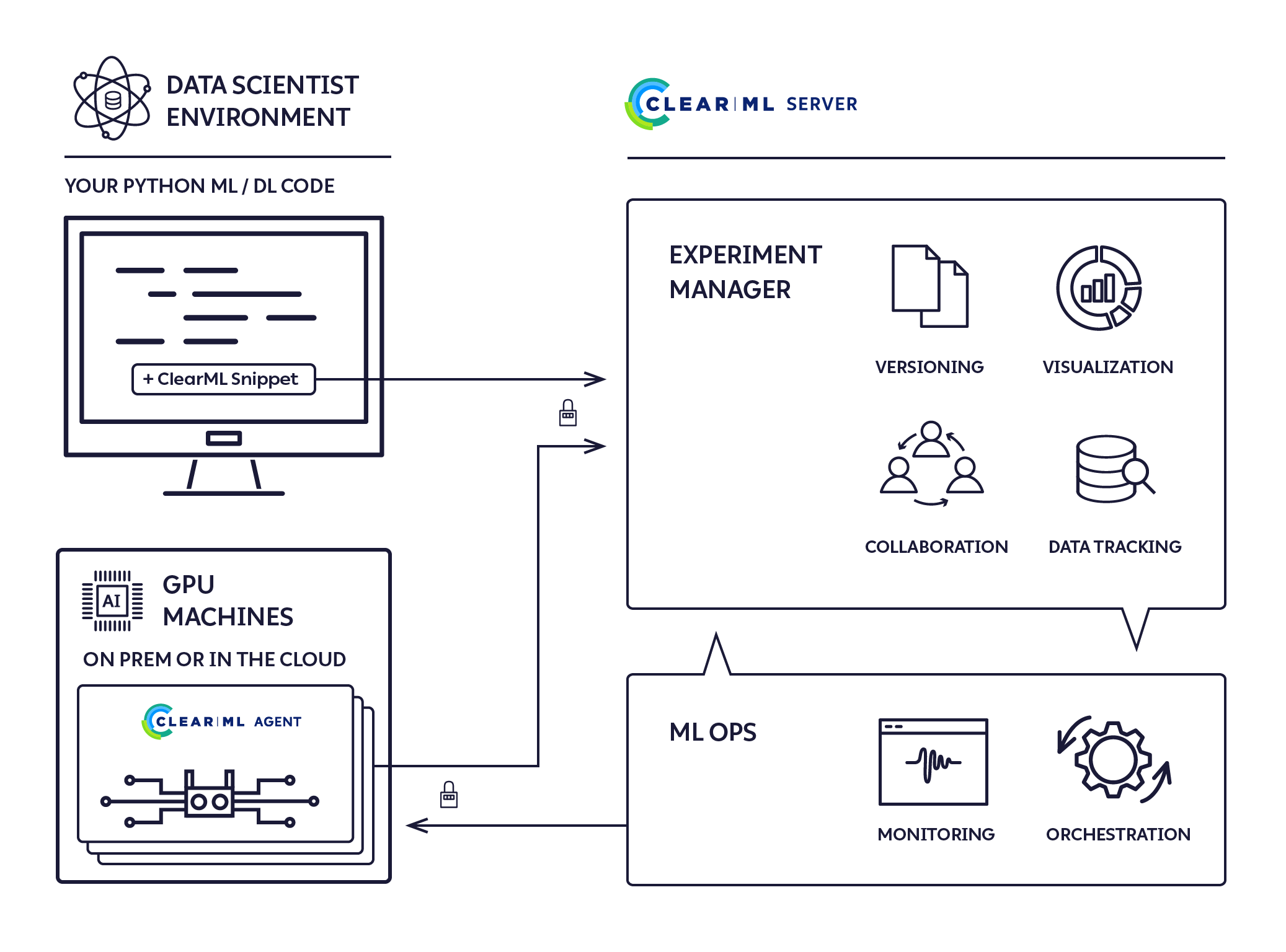
clearml
ClearML - Auto-Magical CI/CD to streamline your AI workload. Experiment Management, Data Management, Pipeline, Orchestration, Scheduling & Serving in one MLOps/LLMOps solution
Stars: 5906
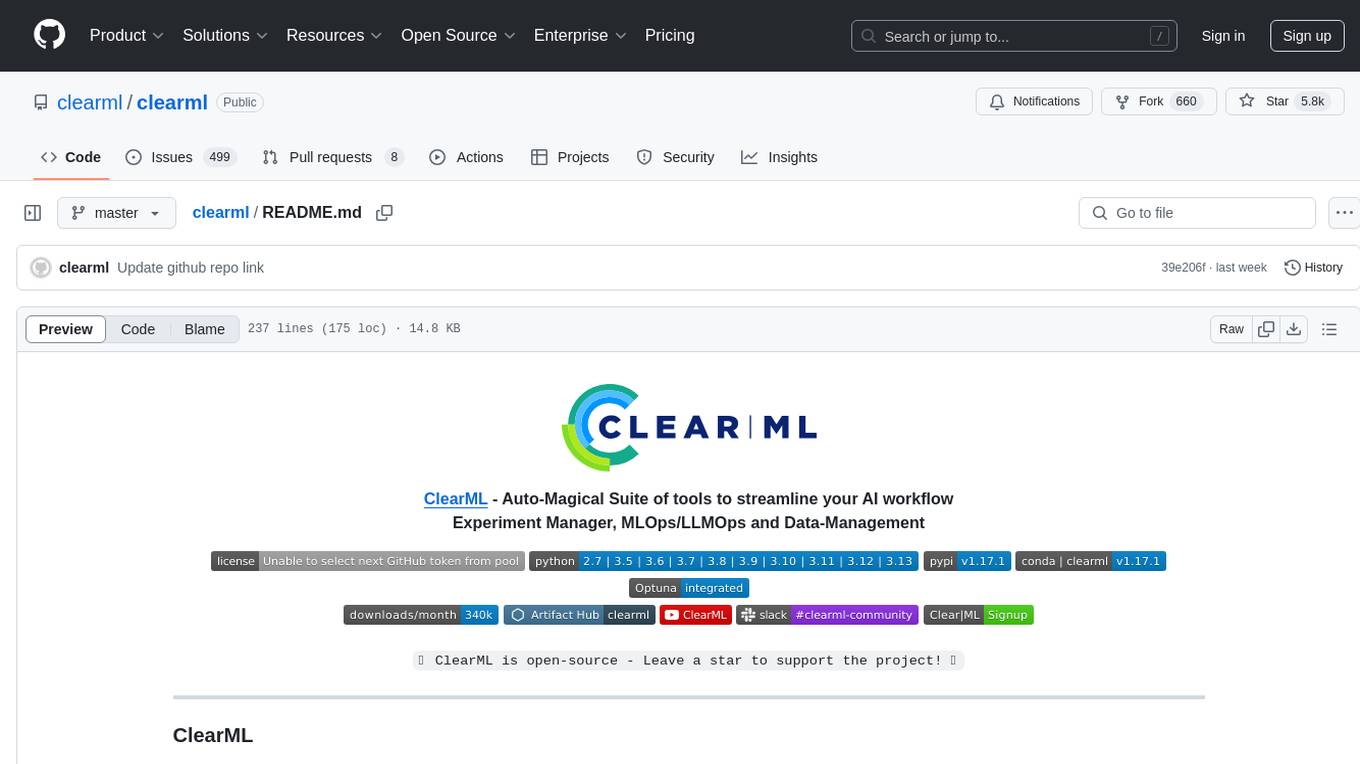
ClearML is an auto-magical suite of tools designed to streamline AI workflows. It includes modules for experiment management, MLOps/LLMOps, data management, model serving, and more. ClearML offers features like experiment tracking, model serving, orchestration, and automation. It supports various ML/DL frameworks and integrates with Jupyter Notebook and PyCharm for remote debugging. ClearML aims to simplify collaboration, automate processes, and enhance visibility in AI projects.
README:
ClearML - Auto-Magical Suite of tools to streamline your AI workflow Experiment Manager, MLOps/LLMOps and Data-Management
🌟 ClearML is open-source - Leave a star to support the project! 🌟
ClearML is a ML/DL development and production suite. It contains FIVE main modules:
- Experiment Manager - Automagical experiment tracking, environments and results
- MLOps / LLMOps - Orchestration, Automation & Pipelines solution for ML/DL/GenAI jobs (Kubernetes / Cloud / bare-metal)
- Data-Management - Fully differentiable data management & version control solution on top of object-storage (S3 / GS / Azure / NAS)
-
Model-Serving - cloud-ready Scalable model serving solution!
- Deploy new model endpoints in under 5 minutes
- Includes optimized GPU serving support backed by Nvidia-Triton
- with out-of-the-box Model Monitoring
- Reports - Create and share rich MarkDown documents supporting embeddable online content
- 🔥 Orchestration Dashboard - Live rich dashboard for your entire compute cluster (Cloud / Kubernetes / On-Prem)
- NEW 💥 Fractional GPUs - Container based, driver level GPU memory limitation 🙀 !!!
Instrumenting these components is the ClearML-server, see Self-Hosting & Free tier Hosting
Sign up & Start using in under 2 minutes
Friendly tutorials to get you started
| Step 1 - Experiment Management |
|
| Step 2 - Remote Execution Agent Setup |
|
| Step 3 - Remotely Execute Tasks |
|
| Experiment Management | Datasets |
 |
 |
| Orchestration | Pipelines |
 |
 |
Adding only 2 lines to your code gets you the following
- Complete experiment setup log
- Full source control info, including non-committed local changes
- Execution environment (including specific packages & versions)
- Hyper-parameters
-
argparse/Click/PythonFire for command line parameters with currently used values - Explicit parameters dictionary
- Tensorflow Defines (absl-py)
- Hydra configuration and overrides
-
- Initial model weights file
- Full experiment output automatic capture
- stdout and stderr
- Resource Monitoring (CPU/GPU utilization, temperature, IO, network, etc.)
- Model snapshots (With optional automatic upload to central storage: Shared folder, S3, GS, Azure, Http)
- Artifacts log & store (Shared folder, S3, GS, Azure, Http)
- Tensorboard/TensorboardX scalars, metrics, histograms, images, audio and video samples
- Matplotlib & Seaborn
- ClearML Logger interface for complete flexibility.
- Extensive platform support and integrations
- Supported ML/DL frameworks: PyTorch (incl' ignite / lightning), Tensorflow, Keras, AutoKeras, FastAI, XGBoost, LightGBM, MegEngine and Scikit-Learn
- Seamless integration (including version control) with Jupyter Notebook and PyCharm remote debugging
-
Sign up for free to the ClearML Hosted Service (alternatively, you can set up your own server, see here).
ClearML Demo Server: ClearML no longer uses the demo server by default. To enable the demo server, set the
CLEARML_NO_DEFAULT_SERVER=0environment variable. Credentials aren't needed, but experiments launched to the demo server are public, so make sure not to launch sensitive experiments if using the demo server. -
Install the
clearmlpython package:pip install clearml
-
Connect the ClearML SDK to the server by creating credentials, then execute the command below and follow the instructions:
clearml-init
-
Add two lines to your code:
from clearml import Task task = Task.init(project_name='examples', task_name='hello world')
And you are done! Everything your process outputs is now automagically logged into ClearML.
Next step, automation! Learn more about ClearML's two-click automation here.
The ClearML run-time components:
- The ClearML Python Package - for integrating ClearML into your existing scripts by adding just two lines of code, and optionally extending your experiments and other workflows with ClearML's powerful and versatile set of classes and methods.
- The ClearML Server - for storing experiment, model, and workflow data; supporting the Web UI experiment manager and MLOps automation for reproducibility and tuning. It is available as a hosted service and open source for you to deploy your own ClearML Server.
- The ClearML Agent - for MLOps orchestration, experiment and workflow reproducibility, and scalability.
- clearml-session - Launch remote JupyterLab / VSCode-server inside any docker, on Cloud/On-Prem machines
- clearml-task - Run any codebase on remote machines with full remote logging of Tensorboard, Matplotlib & Console outputs
- clearml-data - CLI for managing and versioning your datasets, including creating / uploading / downloading of data from S3/GS/Azure/NAS
- AWS Auto-Scaler - Automatically spin EC2 instances based on your workloads with preconfigured budget! No need for AKE!
- Hyper-Parameter Optimization - Optimize any code with black-box approach and state-of-the-art Bayesian optimization algorithms
- Automation Pipeline - Build pipelines based on existing experiments / jobs, supports building pipelines of pipelines!
- Slack Integration - Report experiments progress / failure directly to Slack (fully customizable!)
ClearML is our solution to a problem we share with countless other researchers and developers in the machine learning/deep learning universe: Training production-grade deep learning models is a glorious but messy process. ClearML tracks and controls the process by associating code version control, research projects, performance metrics, and model provenance.
We designed ClearML specifically to require effortless integration so that teams can preserve their existing methods and practices.
- Use it on a daily basis to boost collaboration and visibility in your team
- Create a remote job from any experiment with a click of a button
- Automate processes and create pipelines to collect your experimentation logs, outputs, and data
- Store all your data on any object-storage solution, with the most straightforward interface possible
- Make your data transparent by cataloging it all on the ClearML platform
We believe ClearML is ground-breaking. We wish to establish new standards of true seamless integration between experiment management, MLOps, and data management.
ClearML is supported by you and the clear.ml team, which helps enterprise companies build scalable MLOps.
We built ClearML to track and control the glorious but messy process of training production-grade deep learning models. We are committed to vigorously supporting and expanding the capabilities of ClearML.
We promise to always be backwardly compatible, making sure all your logs, data, and pipelines will always upgrade with you.
Apache License, Version 2.0 (see the LICENSE for more information)
If ClearML is part of your development process / project / publication, please cite us ❤️ :
@misc{clearml,
title = {ClearML - Your entire MLOps stack in one open-source tool},
year = {2024},
note = {Software available from http://github.com/clearml/clearml},
url={https://clear.ml/},
author = {ClearML},
}
For more information, see the official documentation and on YouTube.
For examples and use cases, check the examples folder and corresponding documentation.
If you have any questions: post on our Slack Channel, or tag your questions on stackoverflow with 'clearml' tag (previously trains tag).
For feature requests or bug reports, please use GitHub issues.
Additionally, you can always find us at [email protected]
PRs are always welcome ❤️ See more details in the ClearML Guidelines for Contributing.
May the force (and the goddess of learning rates) be with you!
For Tasks:
Click tags to check more tools for each tasksFor Jobs:
Alternative AI tools for clearml
Similar Open Source Tools

clearml
ClearML is an auto-magical suite of tools designed to streamline AI workflows. It includes modules for experiment management, MLOps/LLMOps, data management, model serving, and more. ClearML offers features like experiment tracking, model serving, orchestration, and automation. It supports various ML/DL frameworks and integrates with Jupyter Notebook and PyCharm for remote debugging. ClearML aims to simplify collaboration, automate processes, and enhance visibility in AI projects.

clearml
ClearML is a suite of tools designed to streamline the machine learning workflow. It includes an experiment manager, MLOps/LLMOps, data management, and model serving capabilities. ClearML is open-source and offers a free tier hosting option. It supports various ML/DL frameworks and integrates with Jupyter Notebook and PyCharm. ClearML provides extensive logging capabilities, including source control info, execution environment, hyper-parameters, and experiment outputs. It also offers automation features, such as remote job execution and pipeline creation. ClearML is designed to be easy to integrate, requiring only two lines of code to add to existing scripts. It aims to improve collaboration, visibility, and data transparency within ML teams.
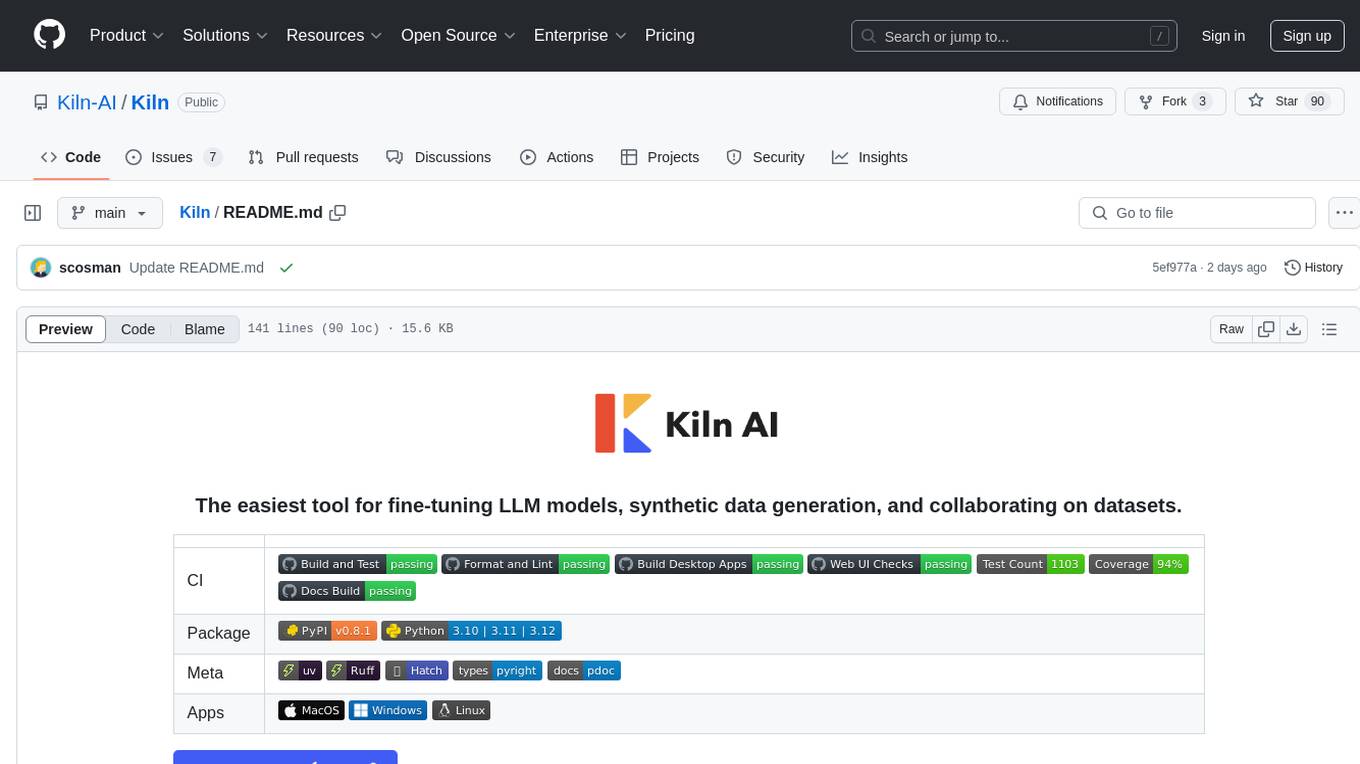
Kiln
Kiln is an intuitive tool for fine-tuning LLM models, generating synthetic data, and collaborating on datasets. It offers desktop apps for Windows, MacOS, and Linux, zero-code fine-tuning for various models, interactive data generation, and Git-based version control. Users can easily collaborate with QA, PM, and subject matter experts, generate auto-prompts, and work with a wide range of models and providers. The tool is open-source, privacy-first, and supports structured data tasks in JSON format. Kiln is free to use and helps build high-quality AI products with datasets, facilitates collaboration between technical and non-technical teams, allows comparison of models and techniques without code, ensures structured data integrity, and prioritizes user privacy.
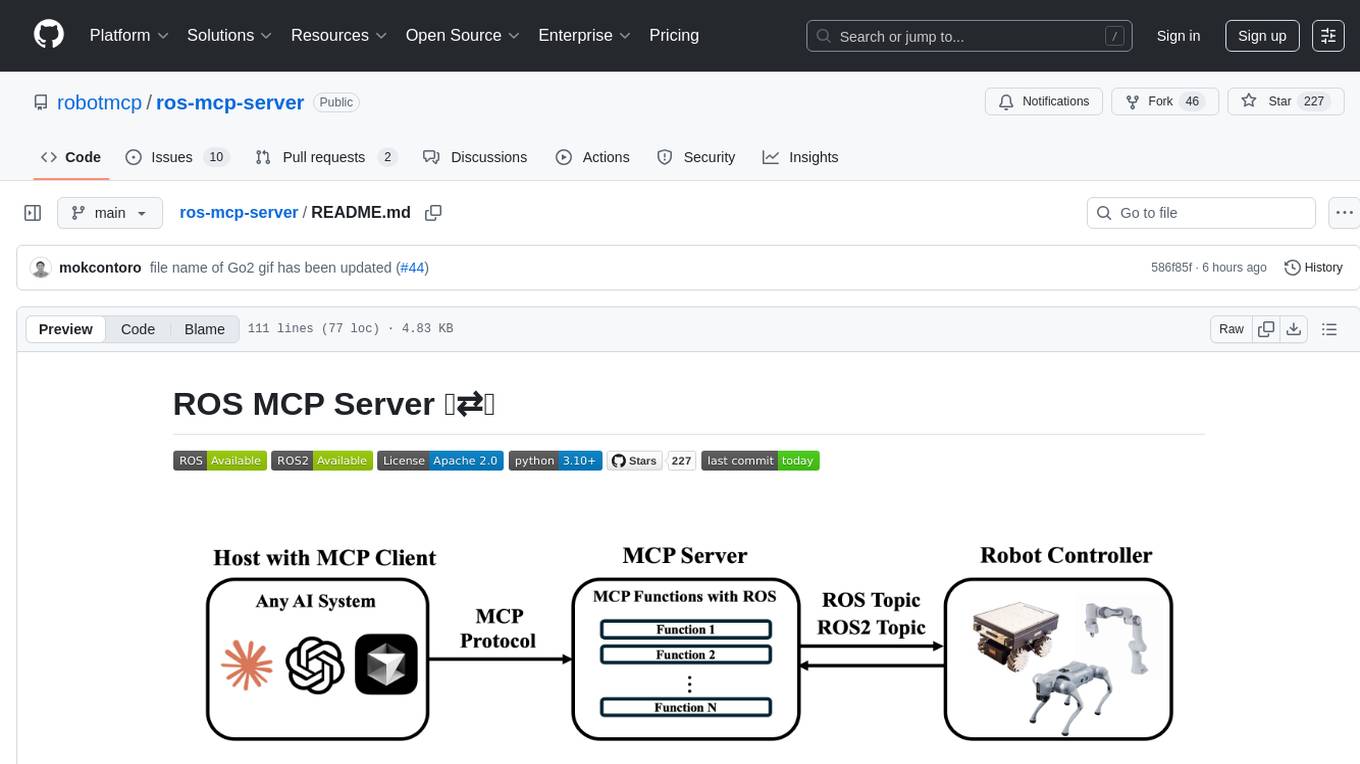
ros-mcp-server
The ros-mcp-server repository contains a ROS (Robot Operating System) package that provides a server for Multi-Contact Planning (MCP) in robotics. The server facilitates the planning of multiple contacts between a robot and its environment, enabling complex manipulation tasks. It includes functionalities for collision checking, motion planning, and contact stability analysis. This tool is designed to enhance the capabilities of robotic systems by enabling them to perform tasks that involve multiple points of contact with the environment. The repository includes documentation and examples to help users integrate the MCP server into their robotic applications.
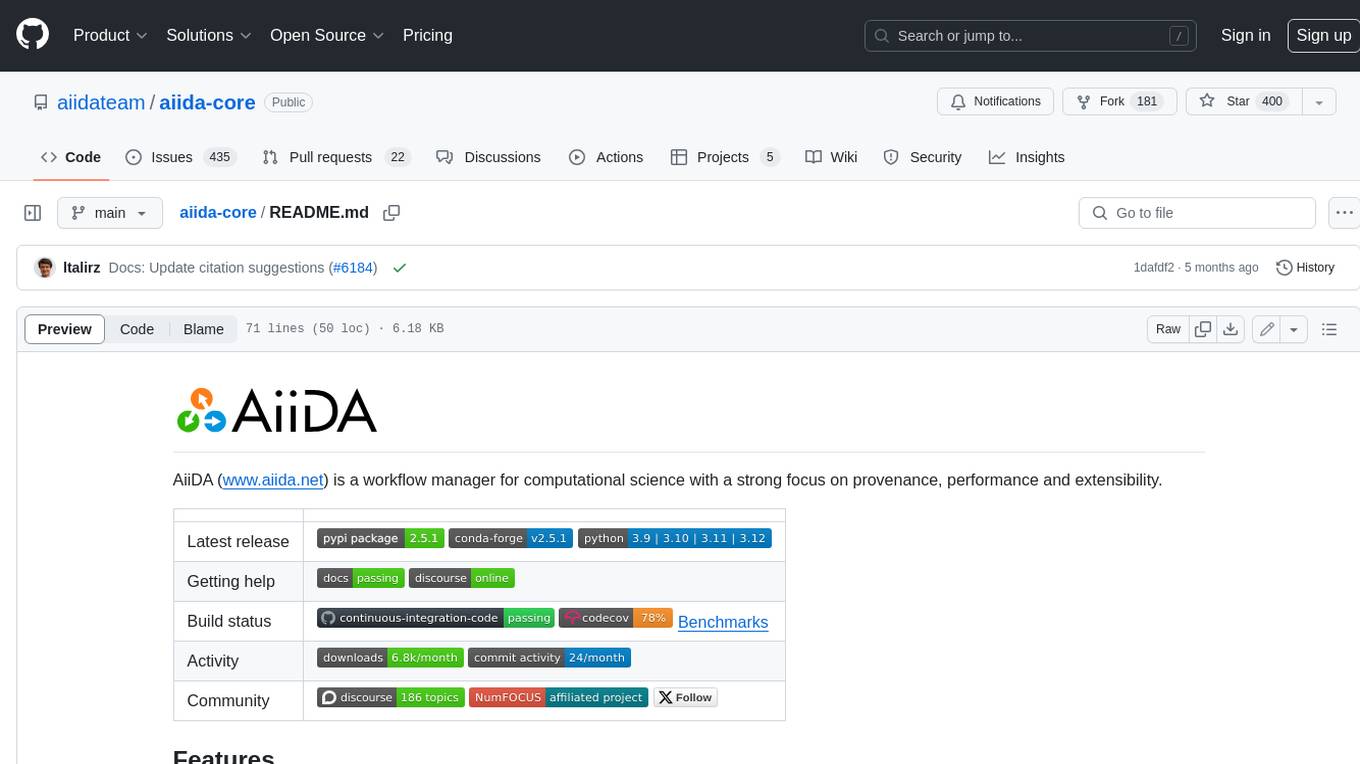
aiida-core
AiiDA (www.aiida.net) is a workflow manager for computational science with a strong focus on provenance, performance and extensibility. **Features** * **Workflows:** Write complex, auto-documenting workflows in python, linked to arbitrary executables on local and remote computers. The event-based workflow engine supports tens of thousands of processes per hour with full checkpointing. * **Data provenance:** Automatically track inputs, outputs & metadata of all calculations in a provenance graph for full reproducibility. Perform fast queries on graphs containing millions of nodes. * **HPC interface:** Move your calculations to a different computer by changing one line of code. AiiDA is compatible with schedulers like SLURM, PBS Pro, torque, SGE or LSF out of the box. * **Plugin interface:** Extend AiiDA with plugins for new simulation codes (input generation & parsing), data types, schedulers, transport modes and more. * **Open Science:** Export subsets of your provenance graph and share them with peers or make them available online for everyone on the Materials Cloud. * **Open source:** AiiDA is released under the MIT open source license

mlflow
MLflow is a platform to streamline machine learning development, including tracking experiments, packaging code into reproducible runs, and sharing and deploying models. MLflow offers a set of lightweight APIs that can be used with any existing machine learning application or library (TensorFlow, PyTorch, XGBoost, etc), wherever you currently run ML code (e.g. in notebooks, standalone applications or the cloud). MLflow's current components are:
* `MLflow Tracking
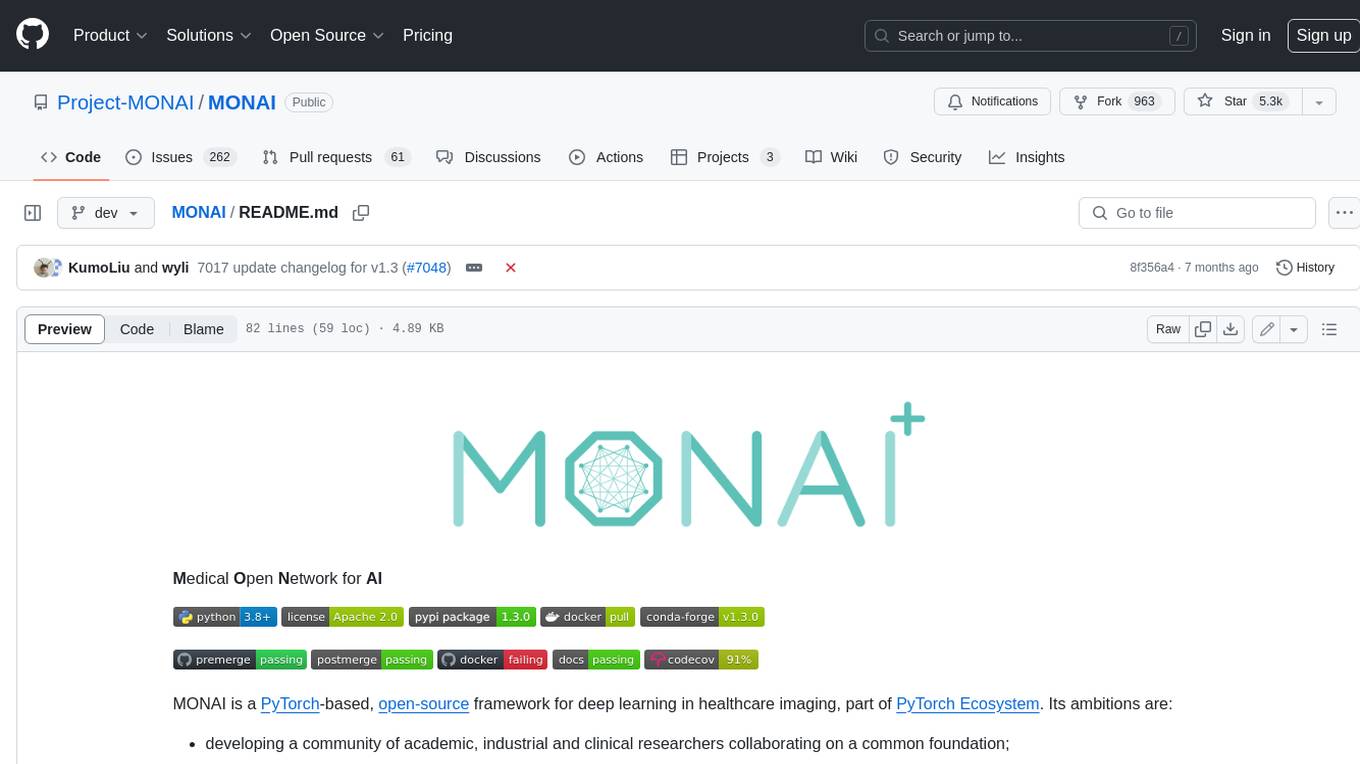
MONAI
MONAI is a PyTorch-based, open-source framework for deep learning in healthcare imaging. It provides a comprehensive set of tools for medical image analysis, including data preprocessing, model training, and evaluation. MONAI is designed to be flexible and easy to use, making it a valuable resource for researchers and developers in the field of medical imaging.
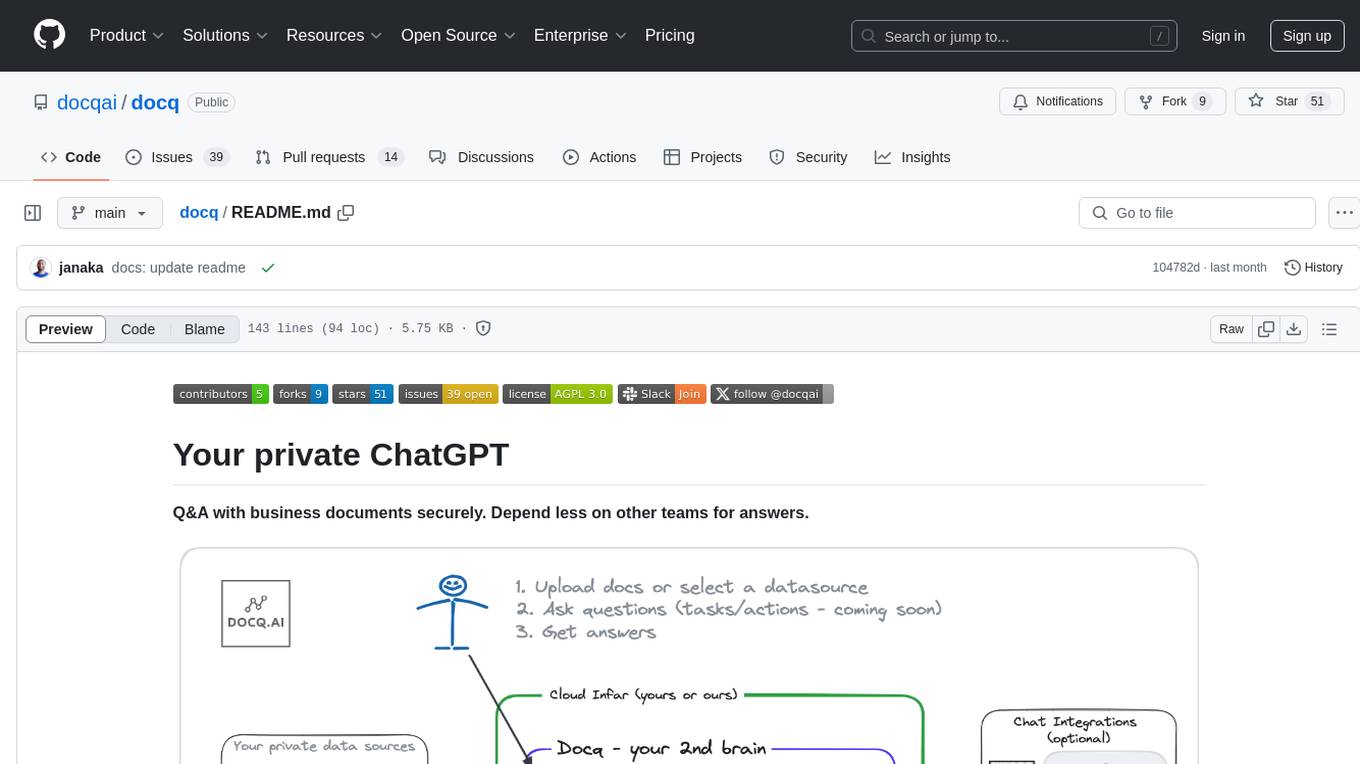
docq
Docq is a private and secure GenAI tool designed to extract knowledge from business documents, enabling users to find answers independently. It allows data to stay within organizational boundaries, supports self-hosting with various cloud vendors, and offers multi-model and multi-modal capabilities. Docq is extensible, open-source (AGPLv3), and provides commercial licensing options. The tool aims to be a turnkey solution for organizations to adopt AI innovation safely, with plans for future features like more data ingestion options and model fine-tuning.
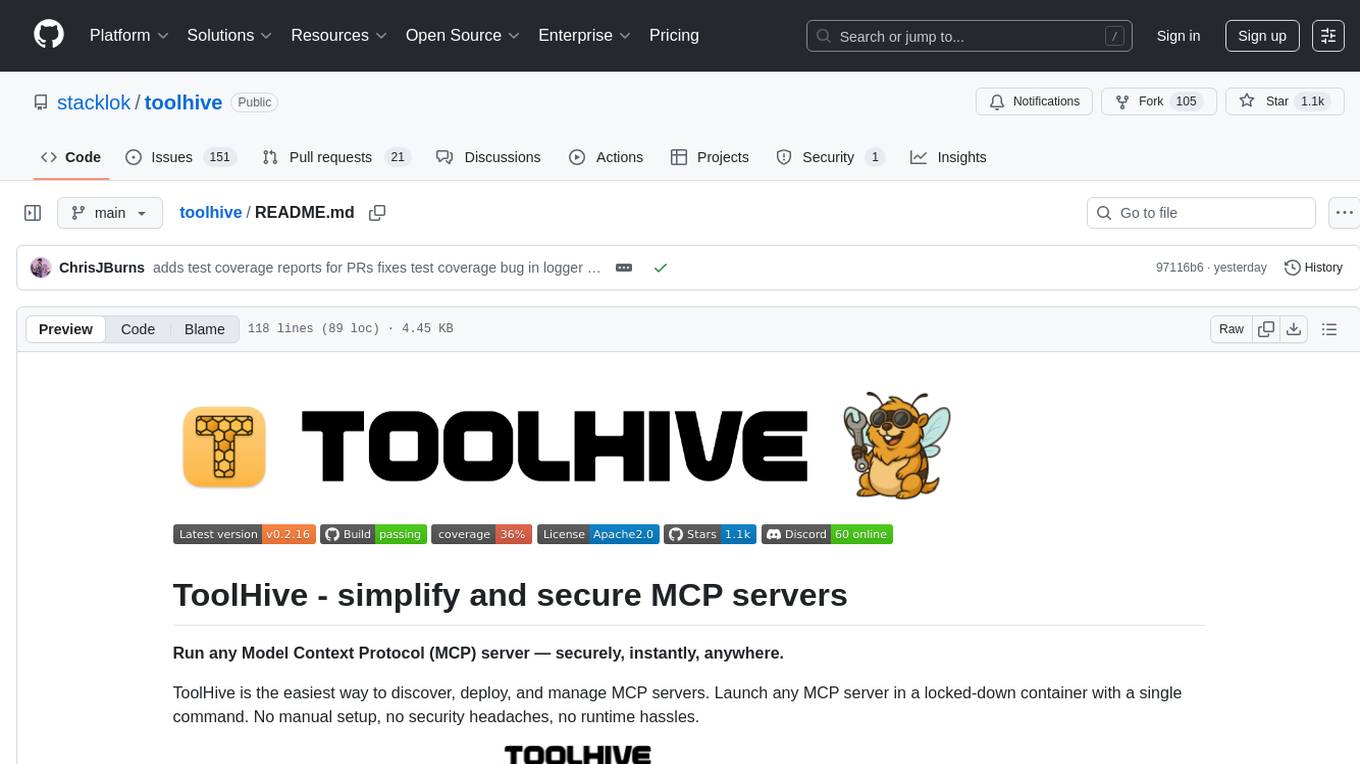
toolhive
ToolHive is a tool designed to simplify and secure Model Context Protocol (MCP) servers. It allows users to easily discover, deploy, and manage MCP servers by launching them in isolated containers with minimal setup and security concerns. The tool offers instant deployment, secure default settings, compatibility with Docker and Kubernetes, seamless integration with popular clients, and availability as a GUI desktop app, CLI, and Kubernetes Operator.
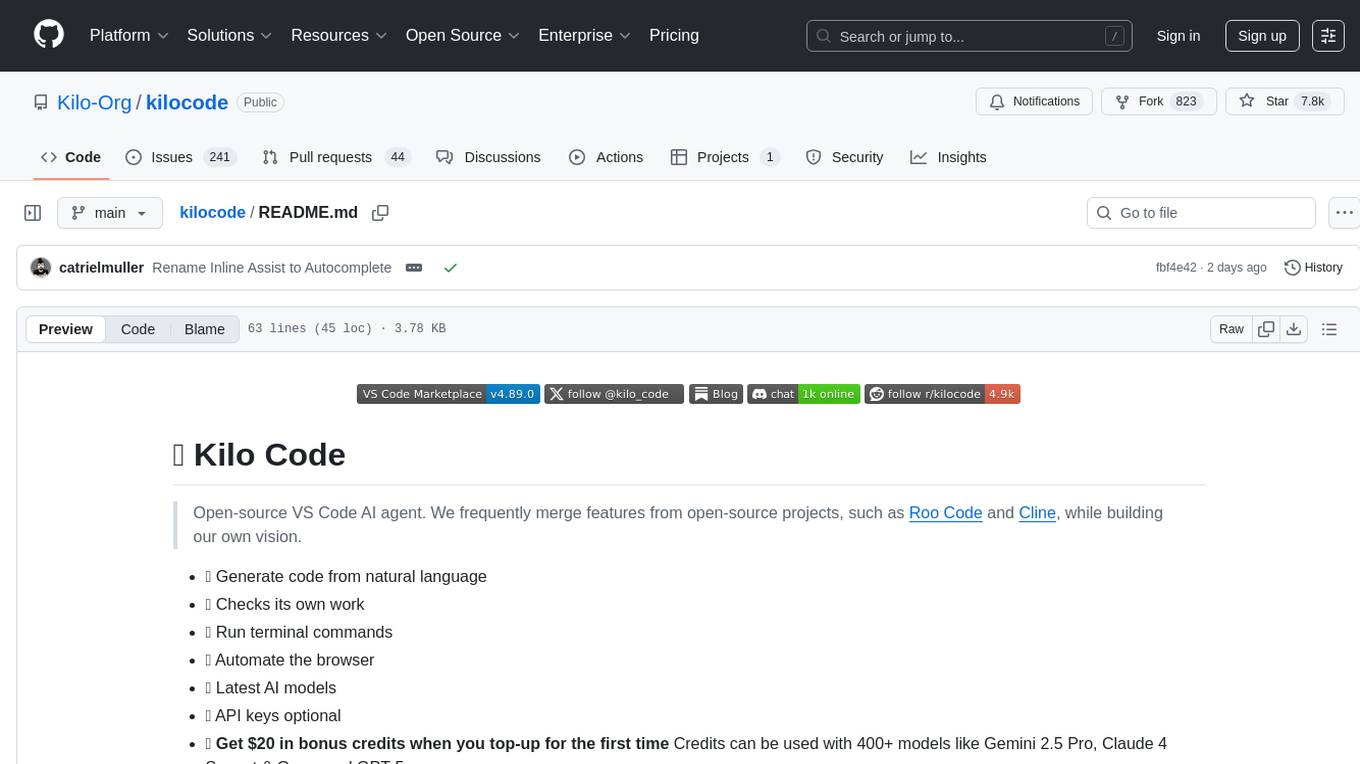
kilocode
Kilo Code is an open-source VS Code AI agent that allows users to generate code from natural language, check its own work, run terminal commands, automate the browser, and utilize the latest AI models. It offers features like task automation, automated refactoring, and integration with MCP servers. Users can access 400+ AI models and benefit from transparent pricing. Kilo Code is a fork of Roo Code and Cline, with improvements and unique features developed independently.
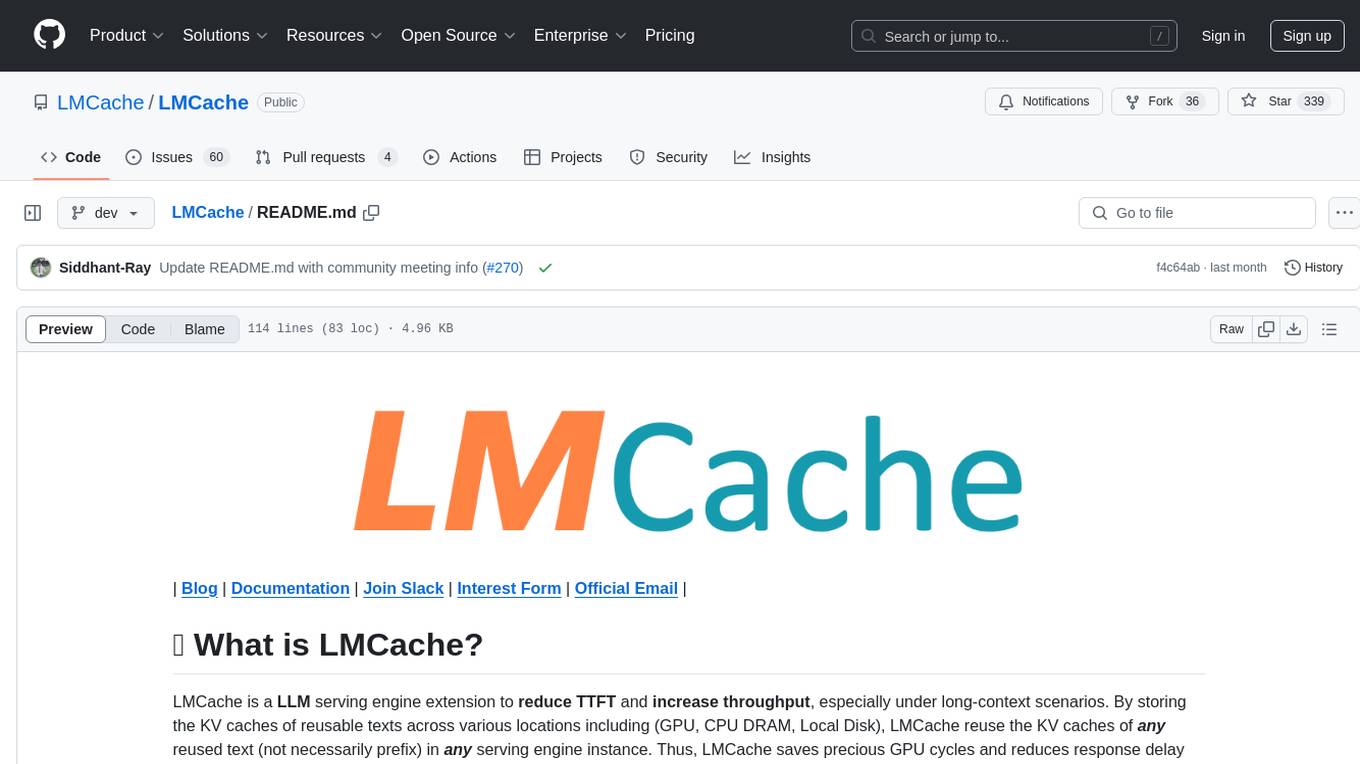
LMCache
LMCache is a serving engine extension designed to reduce time to first token (TTFT) and increase throughput, particularly in long-context scenarios. It stores key-value caches of reusable texts across different locations like GPU, CPU DRAM, and Local Disk, allowing the reuse of any text in any serving engine instance. By combining LMCache with vLLM, significant delay savings and GPU cycle reduction are achieved in various large language model (LLM) use cases, such as multi-round question answering and retrieval-augmented generation (RAG). LMCache provides integration with the latest vLLM version, offering both online serving and offline inference capabilities. It supports sharing key-value caches across multiple vLLM instances and aims to provide stable support for non-prefix key-value caches along with user and developer documentation.
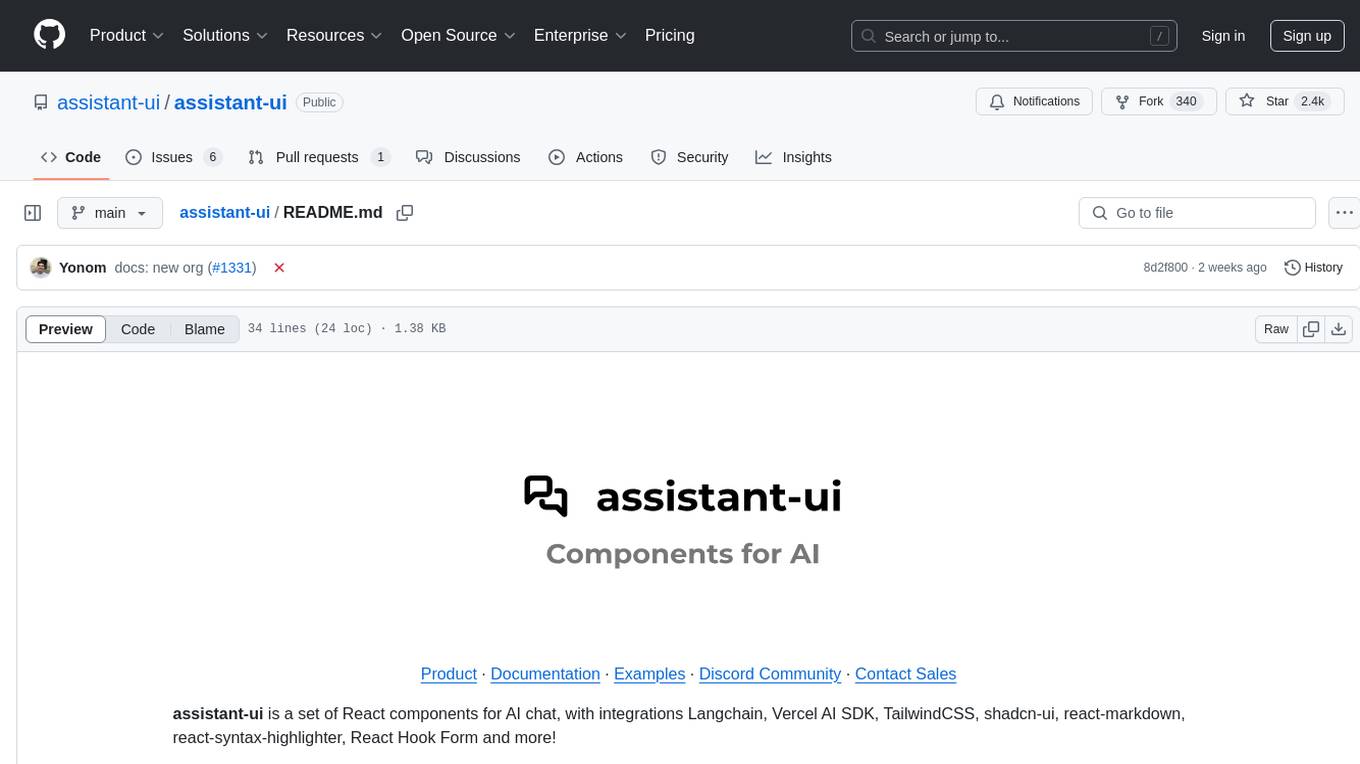
assistant-ui
assistant-ui is a set of React components for AI chat, providing wide model provider support out of the box and the ability to integrate custom APIs. It includes integrations with Langchain, Vercel AI SDK, TailwindCSS, shadcn-ui, react-markdown, react-syntax-highlighter, React Hook Form, and more. The tool allows users to quickly create AI chat applications with pre-configured templates and easy setup steps.

TaskingAI
TaskingAI brings Firebase's simplicity to **AI-native app development**. The platform enables the creation of GPTs-like multi-tenant applications using a wide range of LLMs from various providers. It features distinct, modular functions such as Inference, Retrieval, Assistant, and Tool, seamlessly integrated to enhance the development process. TaskingAI’s cohesive design ensures an efficient, intelligent, and user-friendly experience in AI application development.

anything-llm
AnythingLLM is a full-stack application that enables you to turn any document, resource, or piece of content into context that any LLM can use as references during chatting. This application allows you to pick and choose which LLM or Vector Database you want to use as well as supporting multi-user management and permissions.

SillyTavern
SillyTavern is a user interface you can install on your computer (and Android phones) that allows you to interact with text generation AIs and chat/roleplay with characters you or the community create. SillyTavern is a fork of TavernAI 1.2.8 which is under more active development and has added many major features. At this point, they can be thought of as completely independent programs.
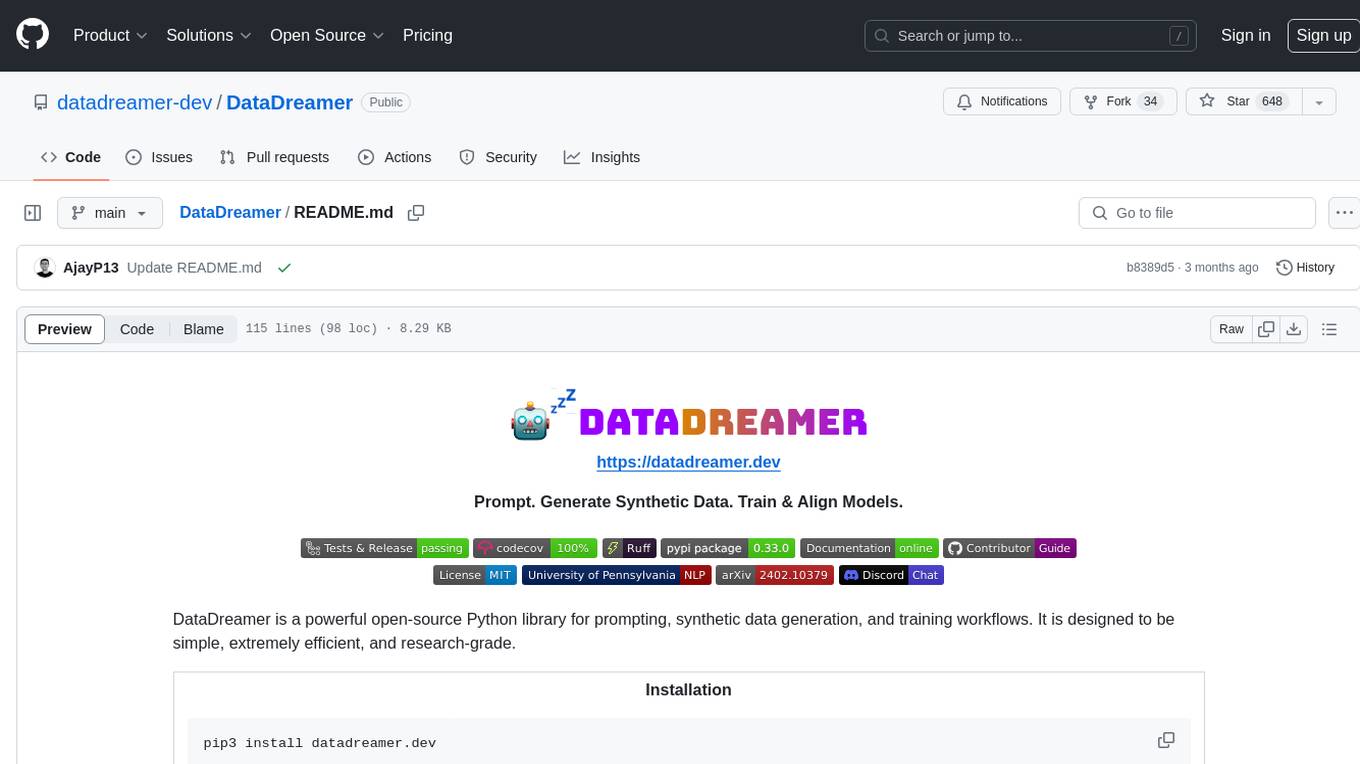
DataDreamer
DataDreamer is a powerful open-source Python library designed for prompting, synthetic data generation, and training workflows. It is simple, efficient, and research-grade, allowing users to create prompting workflows, generate synthetic datasets, and train models with ease. The library is built for researchers, by researchers, focusing on correctness, best practices, and reproducibility. It offers features like aggressive caching, resumability, support for bleeding-edge techniques, and easy sharing of datasets and models. DataDreamer enables users to run multi-step prompting workflows, generate synthetic datasets for various tasks, and train models by aligning, fine-tuning, instruction-tuning, and distilling them using existing or synthetic data.
For similar tasks
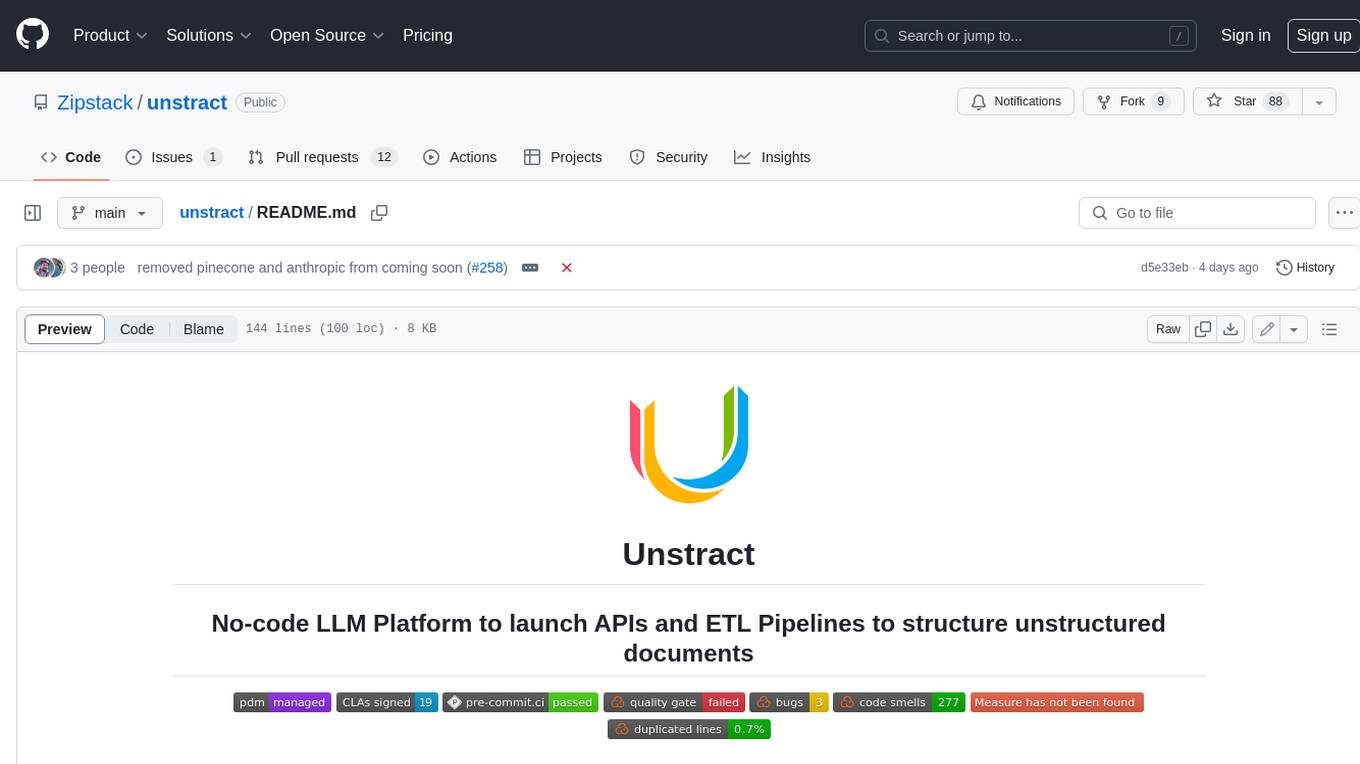
unstract
Unstract is a no-code platform that enables users to launch APIs and ETL pipelines to structure unstructured documents. With Unstract, users can go beyond co-pilots by enabling machine-to-machine automation. Unstract's Prompt Studio provides a simple, no-code approach to creating prompts for LLMs, vector databases, embedding models, and text extractors. Users can then configure Prompt Studio projects as API deployments or ETL pipelines to automate critical business processes that involve complex documents. Unstract supports a wide range of LLM providers, vector databases, embeddings, text extractors, ETL sources, and ETL destinations, providing users with the flexibility to choose the best tools for their needs.
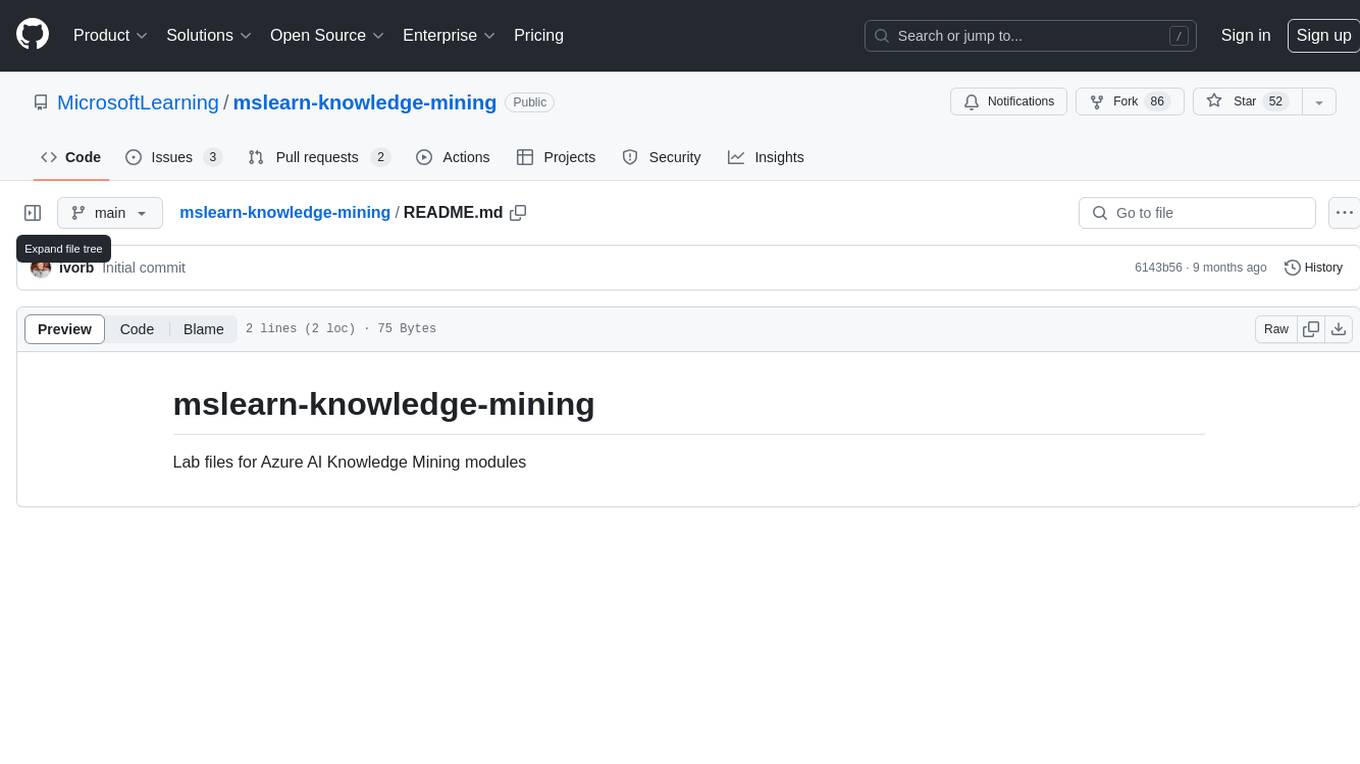
mslearn-knowledge-mining
The mslearn-knowledge-mining repository contains lab files for Azure AI Knowledge Mining modules. It provides resources for learning and implementing knowledge mining techniques using Azure AI services. The repository is designed to help users explore and understand how to leverage AI for knowledge mining purposes within the Azure ecosystem.
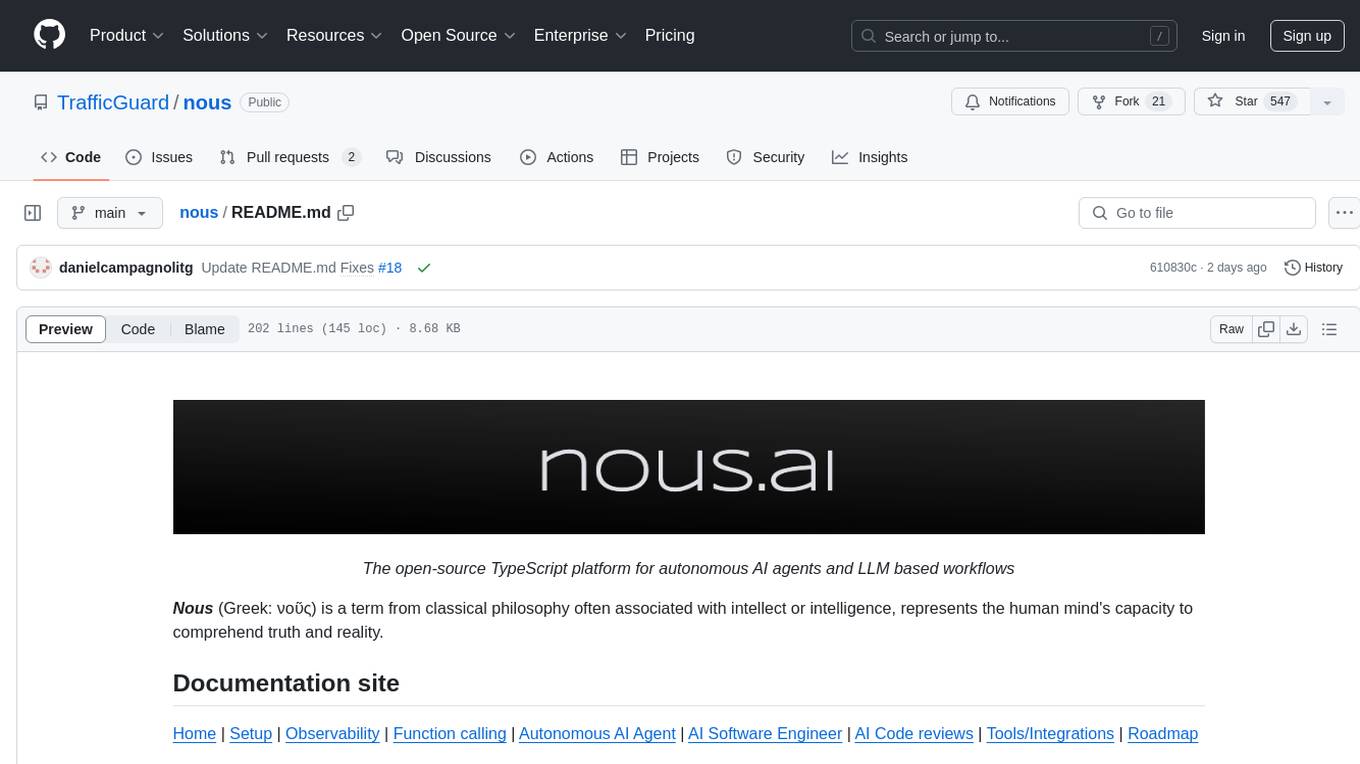
nous
Nous is an open-source TypeScript platform for autonomous AI agents and LLM based workflows. It aims to automate processes, support requests, review code, assist with refactorings, and more. The platform supports various integrations, multiple LLMs/services, CLI and web interface, human-in-the-loop interactions, flexible deployment options, observability with OpenTelemetry tracing, and specific agents for code editing, software engineering, and code review. It offers advanced features like reasoning/planning, memory and function call history, hierarchical task decomposition, and control-loop function calling options. Nous is designed to be a flexible platform for the TypeScript community to expand and support different use cases and integrations.
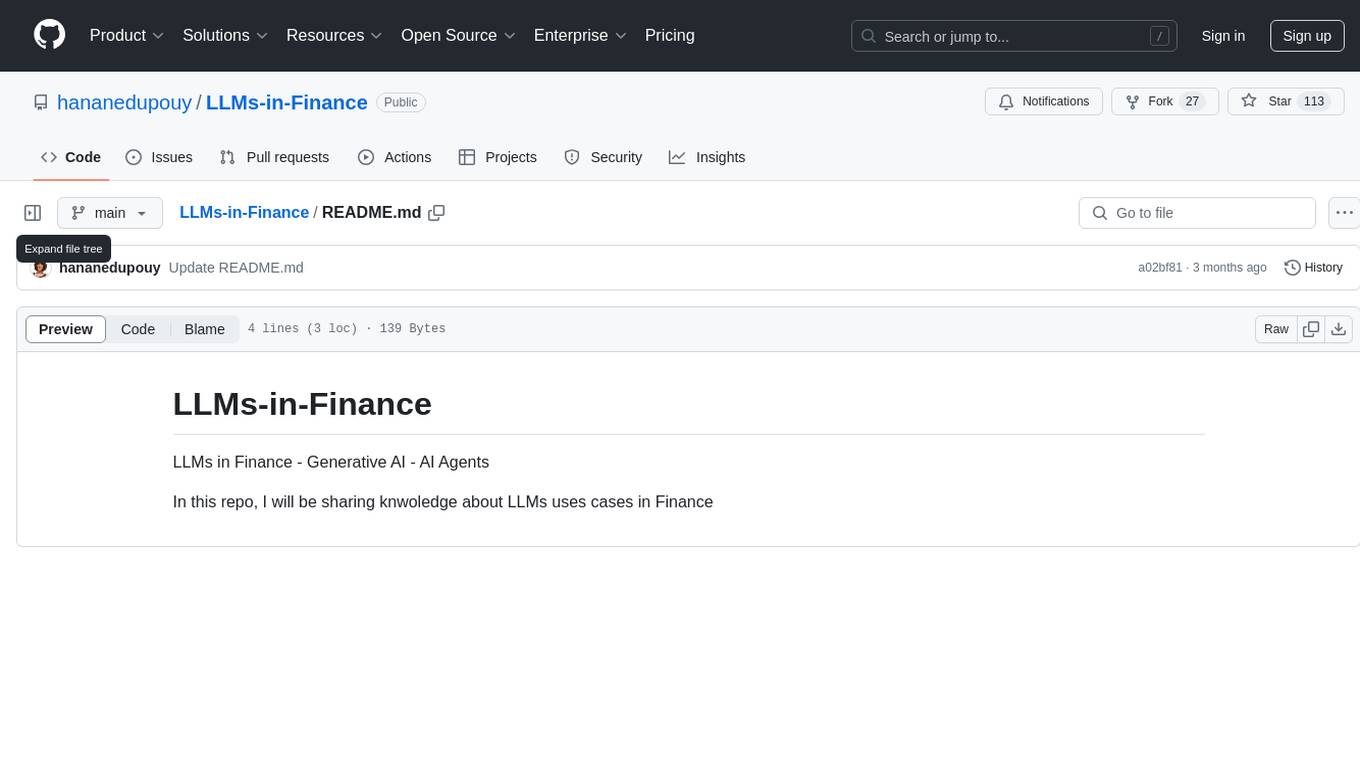
LLMs-in-Finance
This repository focuses on the application of Large Language Models (LLMs) in the field of finance. It provides insights and knowledge about how LLMs can be utilized in various scenarios within the finance industry, particularly in generating AI agents. The repository aims to explore the potential of LLMs to enhance financial processes and decision-making through the use of advanced natural language processing techniques.

docq
Docq is a private and secure GenAI tool designed to extract knowledge from business documents, enabling users to find answers independently. It allows data to stay within organizational boundaries, supports self-hosting with various cloud vendors, and offers multi-model and multi-modal capabilities. Docq is extensible, open-source (AGPLv3), and provides commercial licensing options. The tool aims to be a turnkey solution for organizations to adopt AI innovation safely, with plans for future features like more data ingestion options and model fine-tuning.
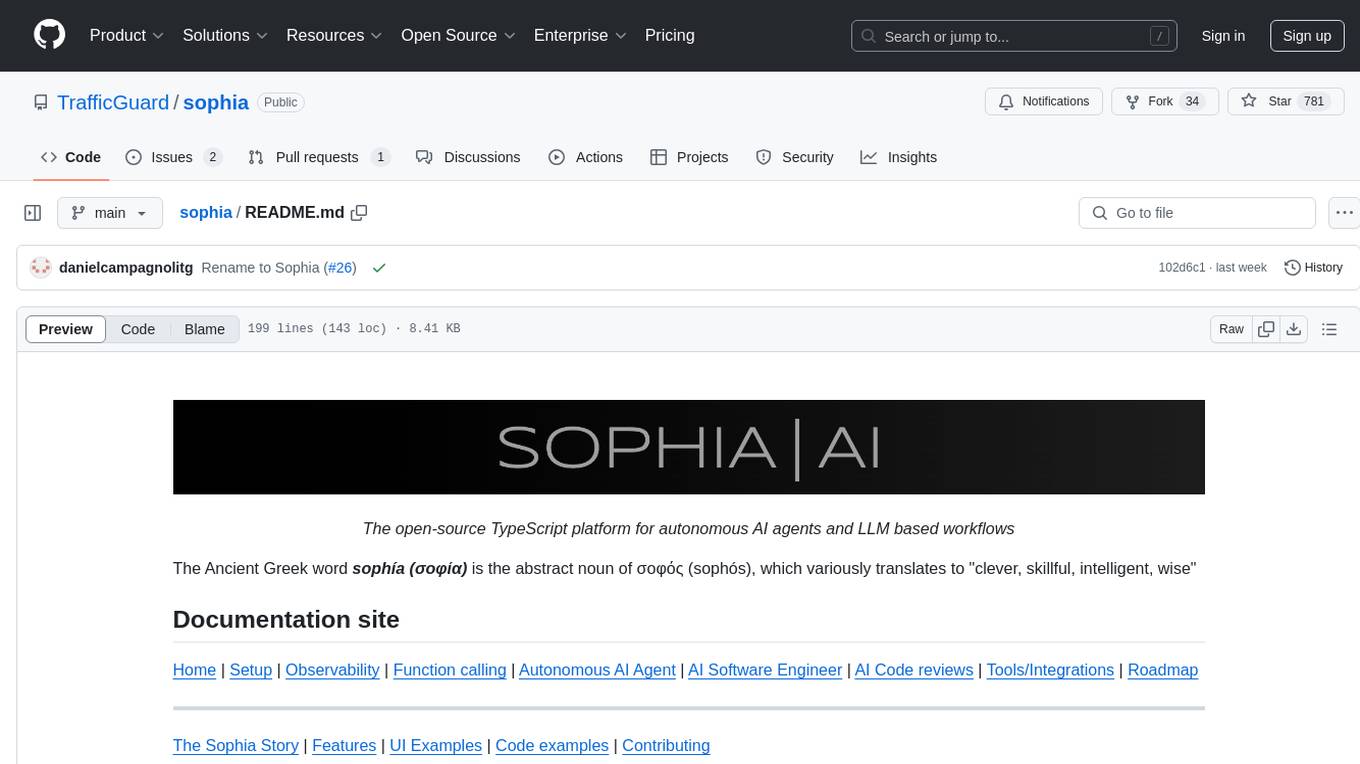
sophia
Sophia is an open-source TypeScript platform designed for autonomous AI agents and LLM based workflows. It aims to automate processes, review code, assist with refactorings, and support various integrations. The platform offers features like advanced autonomous agents, reasoning/planning inspired by Google's Self-Discover paper, memory and function call history, adaptive iterative planning, and more. Sophia supports multiple LLMs/services, CLI and web interface, human-in-the-loop interactions, flexible deployment options, observability with OpenTelemetry tracing, and specific agents for code editing, software engineering, and code review. It provides a flexible platform for the TypeScript community to expand and support various use cases and integrations.
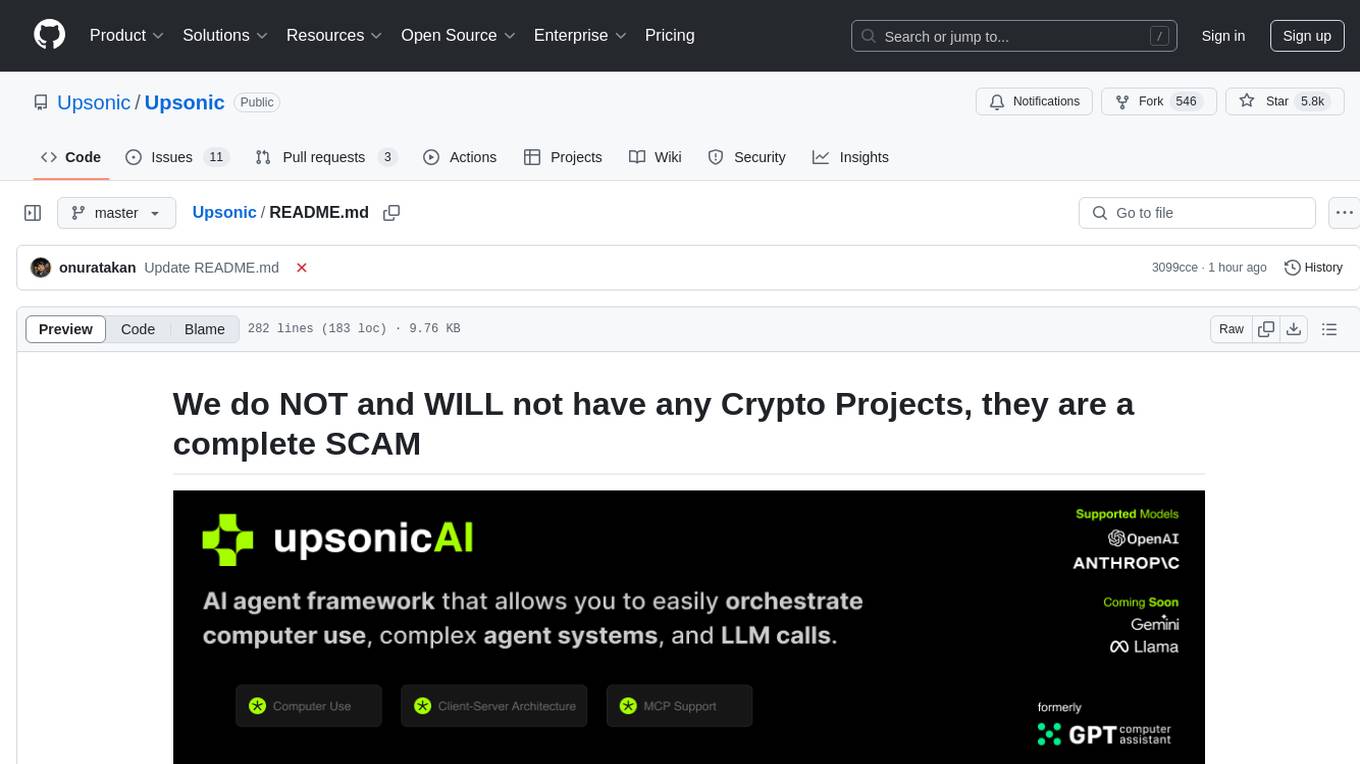
Upsonic
Upsonic offers a cutting-edge enterprise-ready framework for orchestrating LLM calls, agents, and computer use to complete tasks cost-effectively. It provides reliable systems, scalability, and a task-oriented structure for real-world cases. Key features include production-ready scalability, task-centric design, MCP server support, tool-calling server, computer use integration, and easy addition of custom tools. The framework supports client-server architecture and allows seamless deployment on AWS, GCP, or locally using Docker.

clearml
ClearML is an auto-magical suite of tools designed to streamline AI workflows. It includes modules for experiment management, MLOps/LLMOps, data management, model serving, and more. ClearML offers features like experiment tracking, model serving, orchestration, and automation. It supports various ML/DL frameworks and integrates with Jupyter Notebook and PyCharm for remote debugging. ClearML aims to simplify collaboration, automate processes, and enhance visibility in AI projects.
For similar jobs
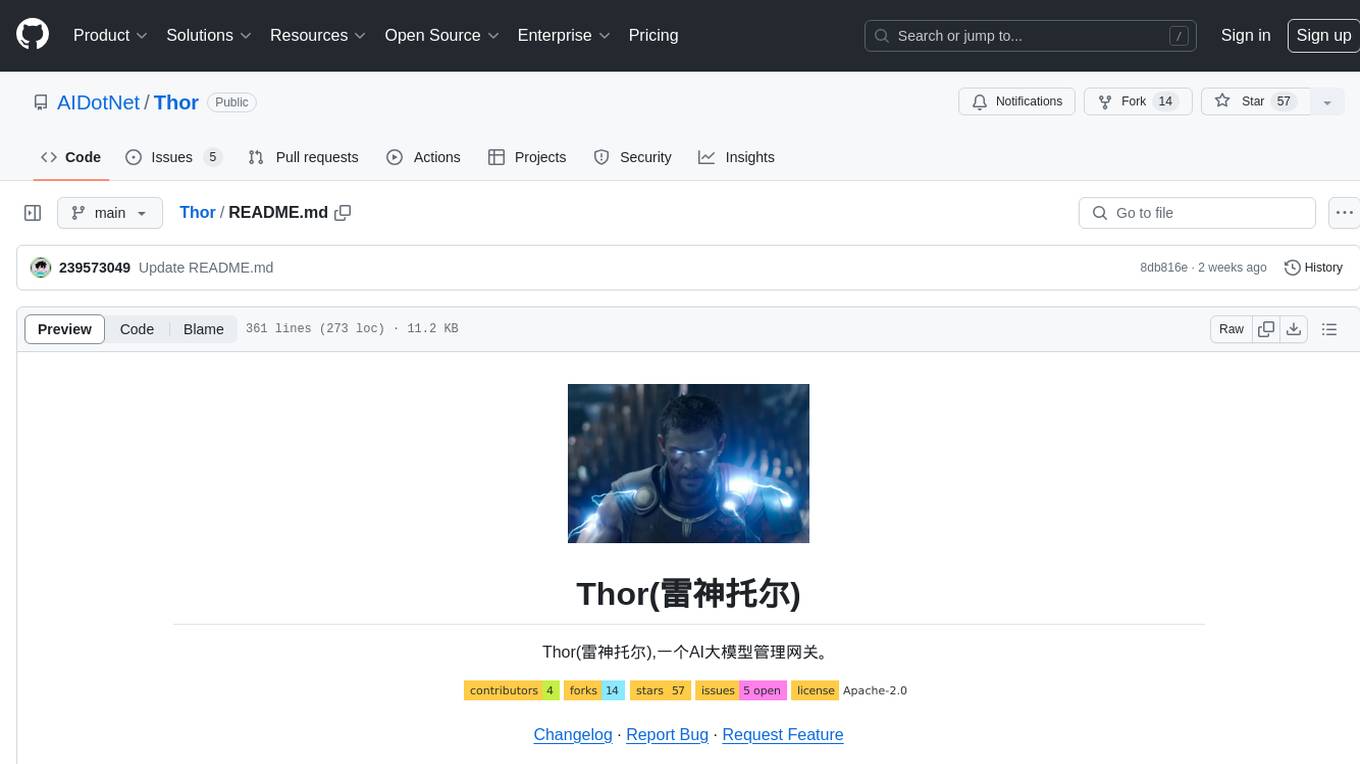
Thor
Thor is a powerful AI model management tool designed for unified management and usage of various AI models. It offers features such as user, channel, and token management, data statistics preview, log viewing, system settings, external chat link integration, and Alipay account balance purchase. Thor supports multiple AI models including OpenAI, Kimi, Starfire, Claudia, Zhilu AI, Ollama, Tongyi Qianwen, AzureOpenAI, and Tencent Hybrid models. It also supports various databases like SqlServer, PostgreSql, Sqlite, and MySql, allowing users to choose the appropriate database based on their needs.
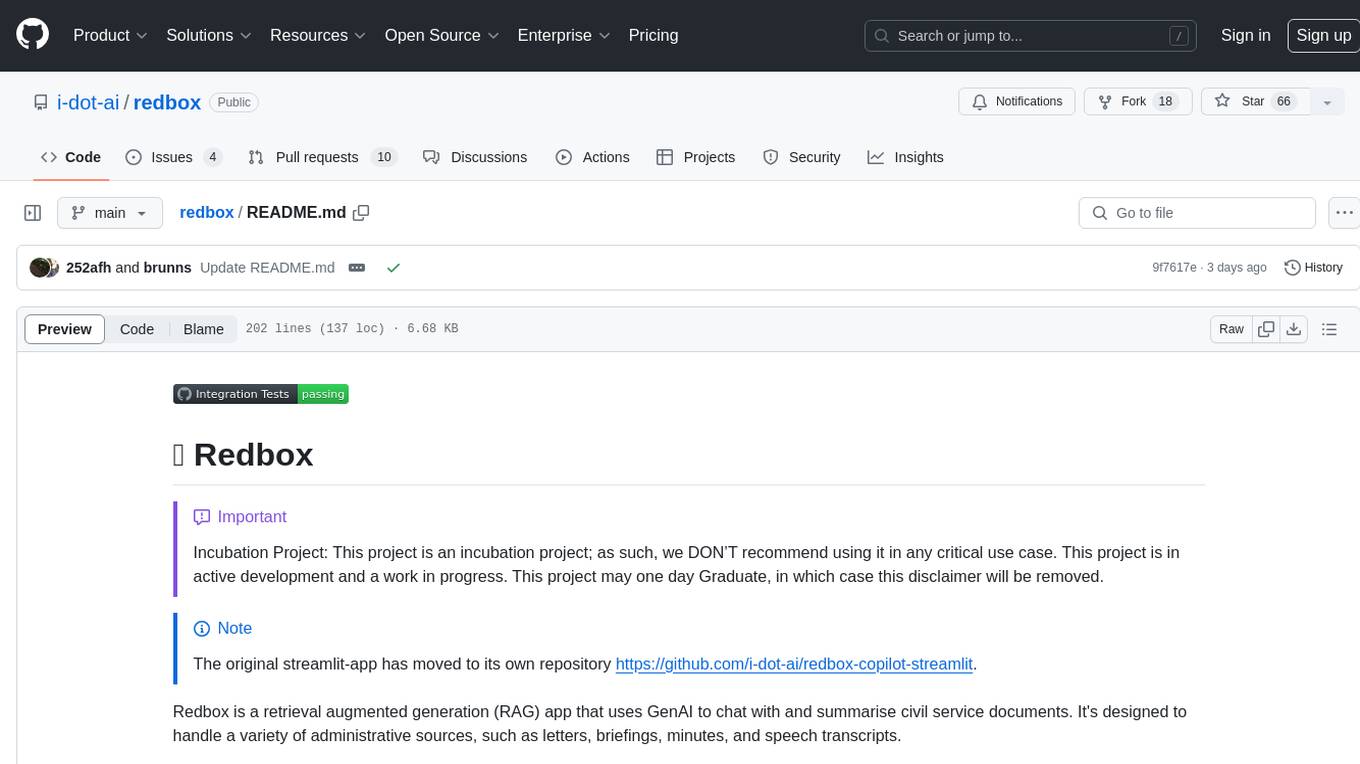
redbox
Redbox is a retrieval augmented generation (RAG) app that uses GenAI to chat with and summarise civil service documents. It increases organisational memory by indexing documents and can summarise reports read months ago, supplement them with current work, and produce a first draft that lets civil servants focus on what they do best. The project uses a microservice architecture with each microservice running in its own container defined by a Dockerfile. Dependencies are managed using Python Poetry. Contributions are welcome, and the project is licensed under the MIT License. Security measures are in place to ensure user data privacy and considerations are being made to make the core-api secure.
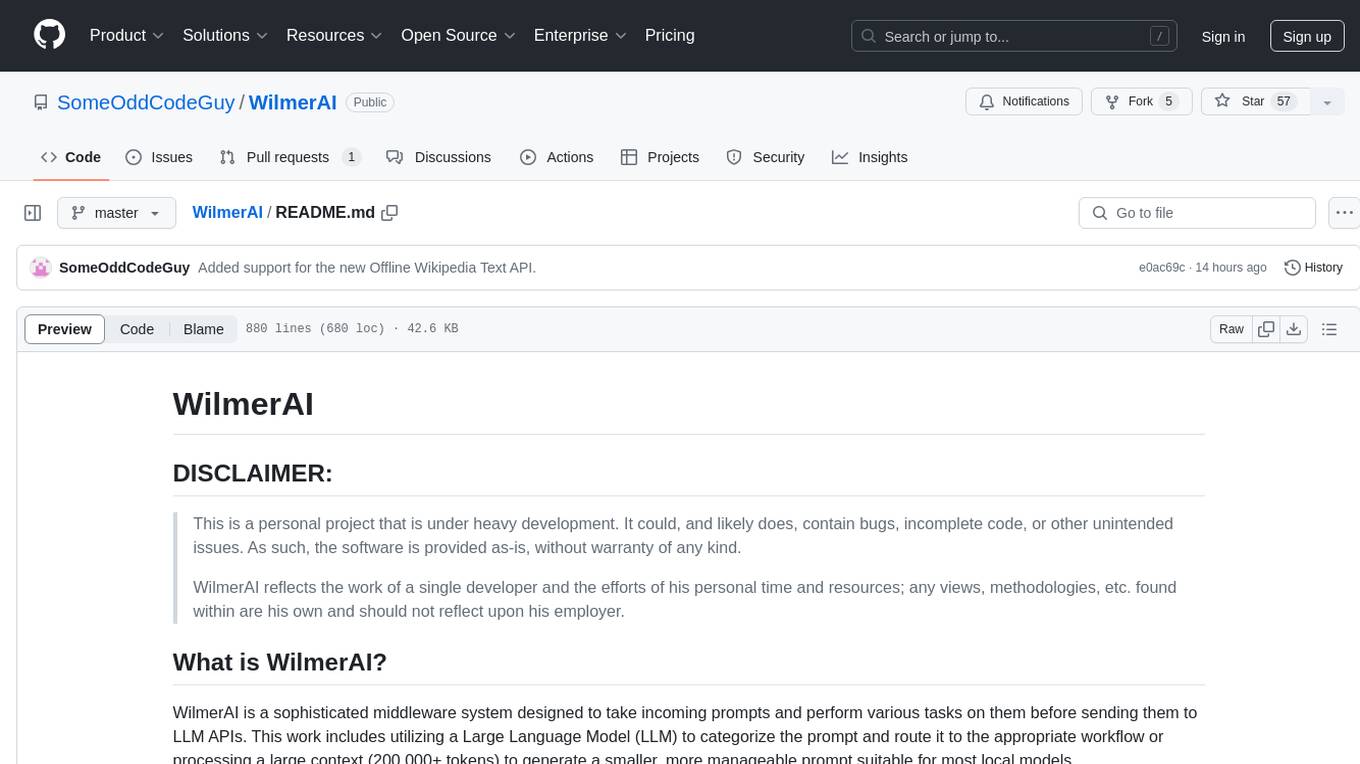
WilmerAI
WilmerAI is a middleware system designed to process prompts before sending them to Large Language Models (LLMs). It categorizes prompts, routes them to appropriate workflows, and generates manageable prompts for local models. It acts as an intermediary between the user interface and LLM APIs, supporting multiple backend LLMs simultaneously. WilmerAI provides API endpoints compatible with OpenAI API, supports prompt templates, and offers flexible connections to various LLM APIs. The project is under heavy development and may contain bugs or incomplete code.
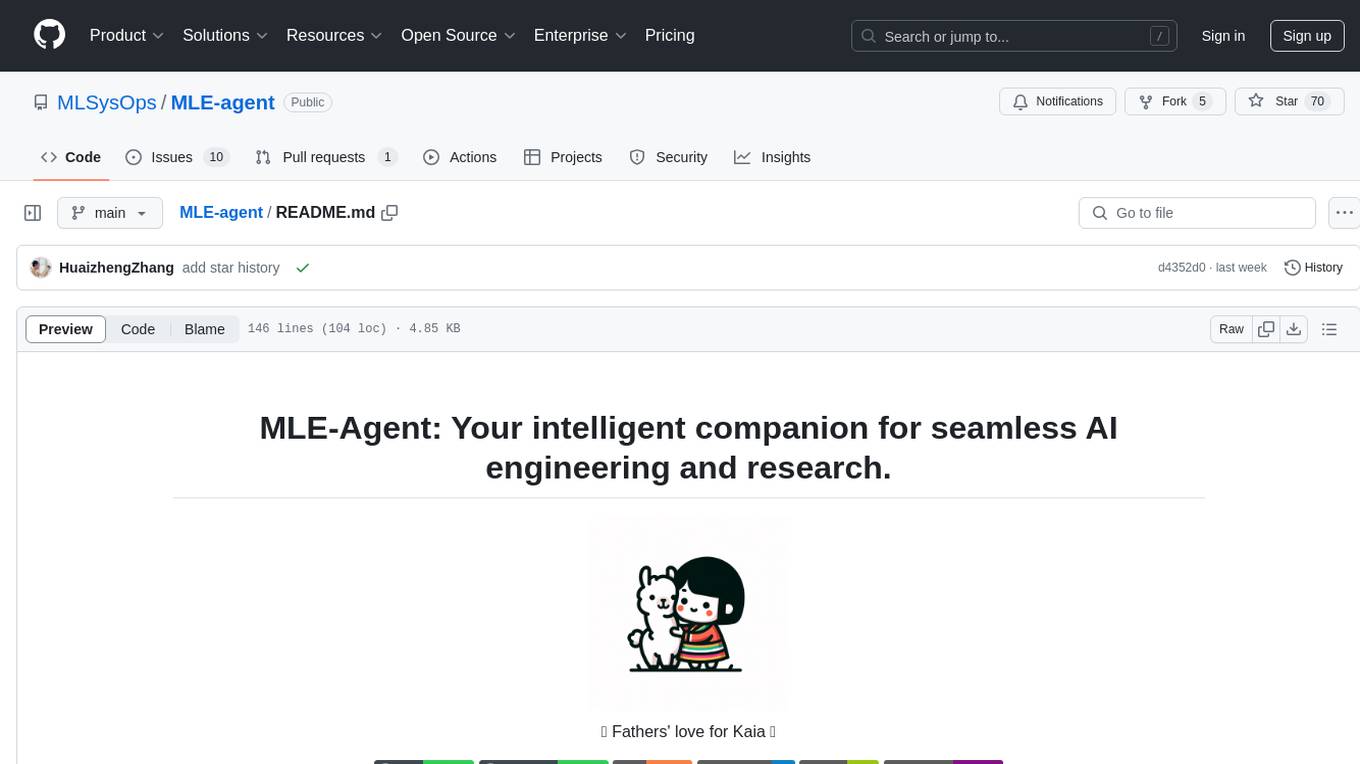
MLE-agent
MLE-Agent is an intelligent companion designed for machine learning engineers and researchers. It features autonomous baseline creation, integration with Arxiv and Papers with Code, smart debugging, file system organization, comprehensive tools integration, and an interactive CLI chat interface for seamless AI engineering and research workflows.
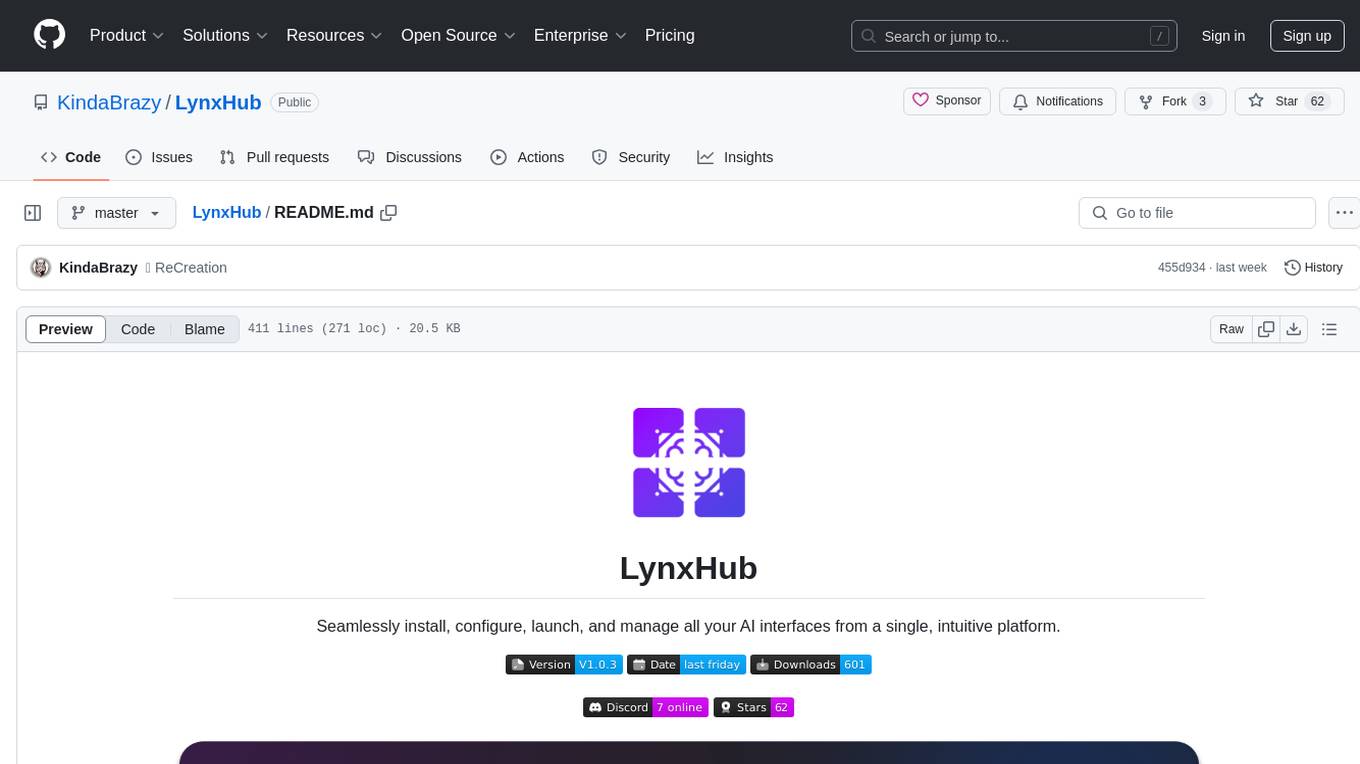
LynxHub
LynxHub is a platform that allows users to seamlessly install, configure, launch, and manage all their AI interfaces from a single, intuitive dashboard. It offers features like AI interface management, arguments manager, custom run commands, pre-launch actions, extension management, in-app tools like terminal and web browser, AI information dashboard, Discord integration, and additional features like theme options and favorite interface pinning. The platform supports modular design for custom AI modules and upcoming extensions system for complete customization. LynxHub aims to streamline AI workflow and enhance user experience with a user-friendly interface and comprehensive functionalities.

ChatGPT-Next-Web-Pro
ChatGPT-Next-Web-Pro is a tool that provides an enhanced version of ChatGPT-Next-Web with additional features and functionalities. It offers complete ChatGPT-Next-Web functionality, file uploading and storage capabilities, drawing and video support, multi-modal support, reverse model support, knowledge base integration, translation, customizations, and more. The tool can be deployed with or without a backend, allowing users to interact with AI models, manage accounts, create models, manage API keys, handle orders, manage memberships, and more. It supports various cloud services like Aliyun OSS, Tencent COS, and Minio for file storage, and integrates with external APIs like Azure, Google Gemini Pro, and Luma. The tool also provides options for customizing website titles, subtitles, icons, and plugin buttons, and offers features like voice input, file uploading, real-time token count display, and more.
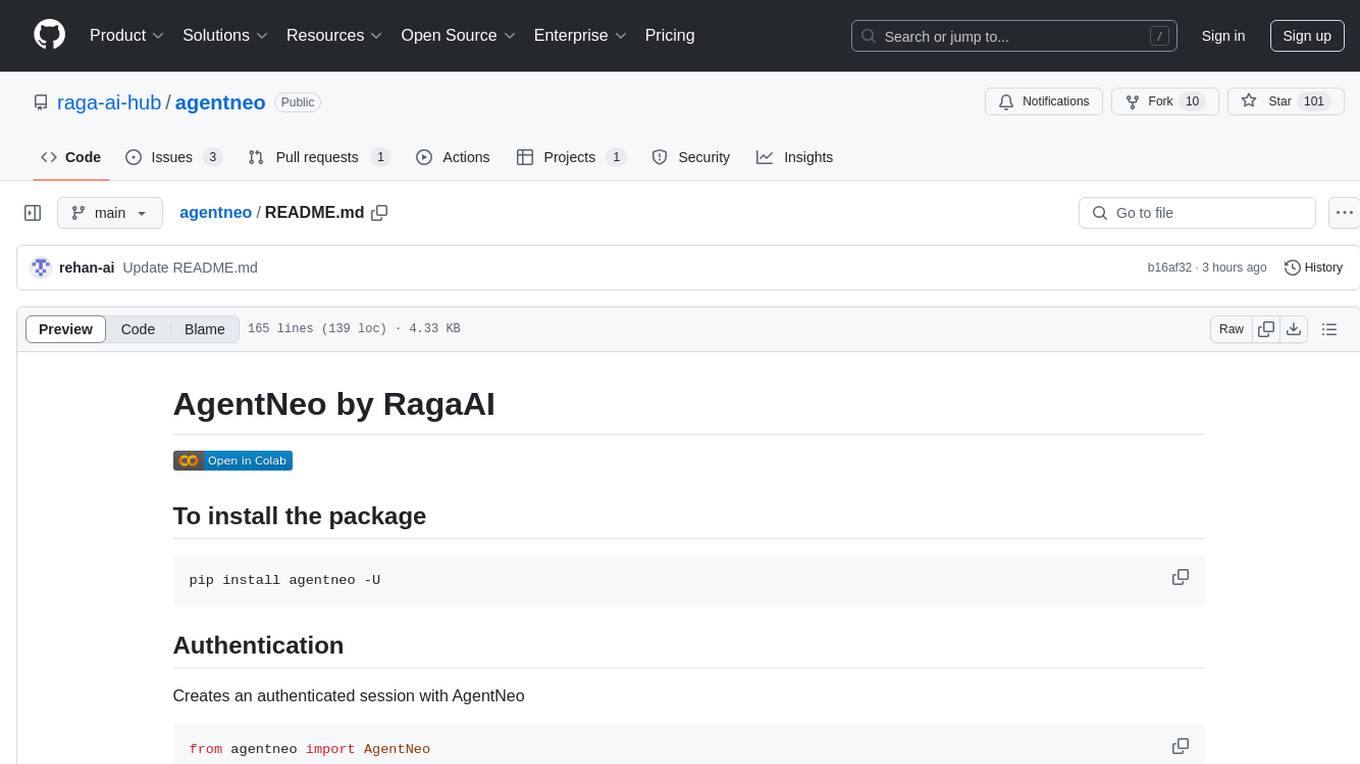
agentneo
AgentNeo is a Python package that provides functionalities for project, trace, dataset, experiment management. It allows users to authenticate, create projects, trace agents and LangGraph graphs, manage datasets, and run experiments with metrics. The tool aims to streamline AI project management and analysis by offering a comprehensive set of features.
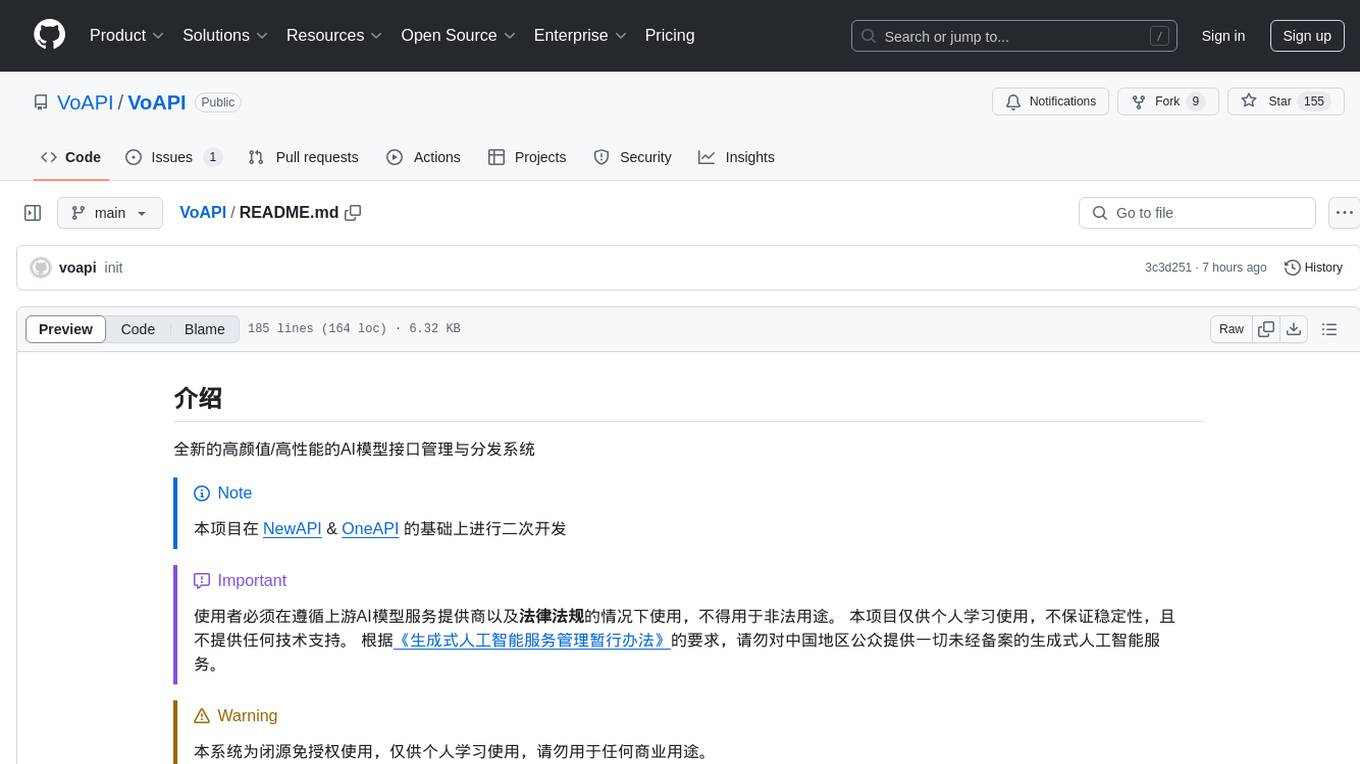
VoAPI
VoAPI is a new high-value/high-performance AI model interface management and distribution system. It is a closed-source tool for personal learning use only, not for commercial purposes. Users must comply with upstream AI model service providers and legal regulations. The system offers a visually appealing interface with features such as independent development documentation page support, service monitoring page configuration support, and third-party login support. Users can manage user registration time, optimize interface elements, and support features like online recharge, model pricing display, and sensitive word filtering. VoAPI also provides support for various AI models and platforms, with the ability to configure homepage templates, model information, and manufacturer information.










